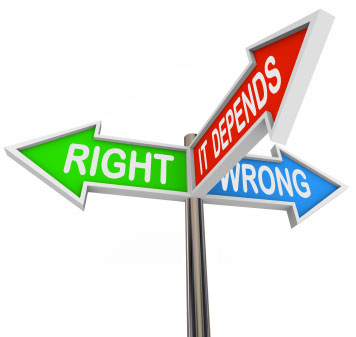I’ve been pretty fortunate; after 38 years of living in Texas, I’ve only encountered blatant anti-atheist bigotry in person a handful of times.
And while I could do a whole write-up about what happened in those encounters (maybe another day), here’s what I found most interesting: Most of those encounters were with people who were/are atheists themselves.
Now I suppose I should back up a bit and clarify what I mean by that. Each of these individuals identified as “agnostics” and explicitly rejected the atheist label while they made incredibly derogatory and blanket characterizations of “atheists”… Yet they also made it explicitly clear that they themselves did not hold any beliefs in the existence of gods, thereby being literally “without theism” and making them also—by definition—atheists.
Now I realize what I just said raises a controversial issue. American Atheists President David Silverman recently took some heat after saying on CNN that those who use labels for themselves such as “agnostic” or “humanist”–while refusing to identify as “atheists”–are “lying” (though in Silverman’s defense, he later said his words were edited to the point of misrepresentation).
And I can understand why the “forcing” of labels onto those who refuse to adopt them is a legitimate concern: If someone in good faith explicitly refuses to adopt a label which indicates a particular ideological position (or in some cases, a whole slew of ideological positions), it’s poor form to force that upon them and essentially say “No, you do subscribe to that ideology (or set of ideologies), despite the fact that you claim not to.” (I add the “in good faith” modifier to make exceptions for cases where the rejection of a label is blatantly self-serving and disingenuous, e.g. white supremacists who reject that label).
But comedian Aziz Ansari provided a counterpoint recently, when he said, regarding feminism:

And I’m inclined to agree as far as feminism is concerned (though of course, the overwhelming majority of those who reject the feminist label tend to have a pretty skewed definition of what the word means).
But notice that the point Ansari makes regarding feminism also applies to the “atheist” label, and even more so. Because atheism isn’t an ideology at all; there isn’t an associated set of beliefs, principles, doctrines, etc. which comes along with the adoption of the term. To be an atheist simply describes your lack of belief on one specific point—the existence of gods. And provided that someone has made clear their position on that one issue, to describe them as an “atheist” isn’t even really a matter of subjective discussion, but rather a simple statement of fact according to their own stated position.
Really, I’m not even sure “label” is even the right term to use when it comes to the word “atheist”. If you describe someone as being “left-handed” because they write with and predominantly use their left hand for fine motor tasks, are you “labeling” them as a left-hander, or are you simply referring to them as what they are by definition? What of describing someone who holds U.S. citizenship as being an “American”? Or someone who has two legs and walks upright as being “bipedal”?
Provided that someone in their own words professes that they don’t believe in the existence of any gods, how is it any different to call them an atheist?
It’s really not.
Yet as simple as this may seem, even brilliant people like Neil DeGrasse Tyson, who can be right on virtually every other issue, manage to get it horribly wrong.
Now it’s important to note that this logic doesn’t necessarily apply to other terms which are often used synonymously with “atheism”. Humanism, for example, actually does entail a set of principles and ideological positions, and is far more than simply an objective descriptor of one’s position on one specific issue. So it makes sense that if someone chooses to explicitly reject the “humanist” label/identity (for example, if they disagree with certain humanist principles, even if they agree with the overwhelming majority of the rest), it would be wrong for others to ascribe that label to them against their wishes.
But to call someone an “atheist” who–according to their own words–doesn’t believe in the existence of any gods? It’s simply expressing a tautological truth, like calling a doctor who treats skin diseases for a living a “dermatologist”, and no matter how much they may dislike the use of the word it doesn’t change the fact that they are one.


